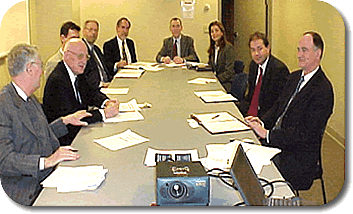Faculty and students in the Environmental and Energy Management program at GW are actively engaged in discussions with several public and private entities to undertake actions directed toward finding new ways of financing critically needed water infrastructure investments around the world. These actions may manifest themselves into a symposium on public-private partnerships (PPP) in water and wastewater facilities that may be held at GW in 2004, and an extended-term research project investigating the conditions under which various types of PPP arrangements make sense in various parts of the world.
At the Rio Conference in 1992 on Environment and Development it was recognized that more financial resources will be needed for sustainable development and poverty reduction. Freshwater was identified as a major issue where considerable additional resources are needed. At the 2nd World Water Forum in The Hague in March 2000, the Vision and Framework for Action called for more investment to meet agreed international targets as well as more innovative means to secure the needed finance. The Ministerial Declaration endorsed this drive for additional funding.
In response to these calls, the World Water Council, the Third World Water Forum and the Global Water Partnership, came together to form a panel to consider solutions to the future global financial needs of the water sector. The panel presented its report to the 3rd WWF in Kyoto in March 2003. These findings are directly related to GW’s initiatives in this area.
The world's water is a finite resource, and pressures on it are mounting from the growth in population and the need to reduce the current backlog of services. A few key facts illustrate the gravity of the problem:
· It is estimated that over one billion people are not connected to safe water supplies and two and a half billion lack proper sanitation. The costs of this situation are borne in terms of avoidable deaths and disease, misery, reduced livelihoods, and degradation of the environment.
· A growing global population will need more food, and irrigated agriculture accounts for more than two-thirds of existing water use. There is much waste and inefficiency in existing irrigation systems and growing conflict with other sectors over the allocation of scarce water. Major investment will be necessary to improve the management and use of water in farming in order to provide food security for future populations.
· Alongside the satisfaction of basic needs for drinking water, sanitation and food security is the urgent task of stemming water pollution from municipal wastewater, industrial effluent and agricultural discharges. Such pollution is a hazard to health and welfare, is an environmental menace, and prevents the water being used again except after costly treatment.
· Failure to manage the consequences of extreme water-related events such as floods and droughts cause more loss of life and costs than any other natural disasters.
This grave situation arises from the fact that not enough financial and managerial resources are being devoted to addressing these problems by different nations. The GW E&EM research program is trying to discover why this happens and to develop approaches that may help to improve this situation. Currently involved in the effort are Professors Jonathan Deason, Jerry Sherk, William Roper and Paul Bourget, along with graduate students Ed Hagarty, David Rigby, Elvin Yuzugullu, Nick Martin, Dulce Meldau and Bruk Berhane. Former Commander of the U.S. Army Corps of Engineers Lieutenant General Vald Heiberg and former World Bank Senior Water Resources Advisor Guy LeMoigne have joined the GW E&EM team for the effort. The E&EM team presently is working on the prospective project with officials of the World Bank, the Suez Corporation, the Global Environment Fund, and the Institute for Water Resources.


